
Friedrich-Alexander-Universität Erlangen
Lehrstuhl für Mustererkennung
Martensstraße 3
91058 Erlangen

My email address is listed ![]() here; or evaluate
here; or evaluate
perl -e 'print scalar reverse "\ned.uaf\@sseir.naitsirhc"'
Phase-contrast X-ray imaging is promising greatly improved sensitivity to varying types of soft tissue, that are challenging to distinguish with conventional X-ray. Our goal is to bring phase-contrast X-ray into clinical practice. Towards this, our group works on image processing of the phase-contrast images and 3-D reconstruction of tomographic acquisitions. My particular interest lies in the low-level, physics-based optimization of a grating-based setup for clinical tasks. Our ![]() research page lists all ongoing projects.
research page lists all ongoing projects.
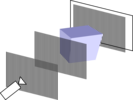

Phase-contrast X-ray imaging is promising greatly improved sensitivity to varying types of soft tissue, that are challenging to distinguish with conventional X-ray. Our goal is to bring phase-contrast X-ray into clinical practice. Towards this, our group works on image processing of the phase-contrast images and 3-D reconstruction of tomographic acquisitions. My particular interest lies in the low-level, physics-based optimization of a grating-based setup for clinical tasks. Our ![]() research page lists all ongoing projects.
research page lists all ongoing projects.
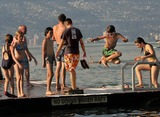 |
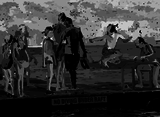 |
We face an abundance of digital imagery, as well as the wide availability of photo editing software. Knowing that a digital image is authentic becomes increasingly important in many scenarios, for instance law enforcement, journalism and for insurance companies. In past times, human experts were called to assess images from dubious sources. Digital imagery opens novel opportunities, as well as new challenges in determining authenticity and origin. For instance, statistical artifacts, as well as physical properties like the lighting environment are very difficult to assess for humans. Computational methods can greatly support the expert in judging images under examination. Moreover, a number of methodologies can operate in a fully unsupervised manner, such that even large archives can be scanned for manipulated images.
A blind image forensics toolbox should consist of a number of diverse algorithms to detect tampered images. So far, manipulations can often be disguised against a particular detection algorithm, but with an increasing number of tools, it becomes less and less likely that a falsifier manages to evade all detection methods.
My main interest lies in the application of computer vision methodologies to image forensics. I am working on estimating properties of the illumination environment, and verifying the expected physical behavior of natural images.
Check out our ![]() project page for a full list of our work, as well as my
project page for a full list of our work, as well as my ![]() publications on image forensics!
publications on image forensics!
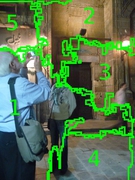
The color of a pixel exhibits a mixture of illumination color, surface color and the in-camera processing. For white balancing, color-based recognition and image retrieval, a separation of illumination and surfaces is most important. Towards this goal, we investigate methods for the estimation of the illuminant color. Recent work includes the investigation of scenes with several different illuminants.
The ![]() project page contains a list of works in this field. My publications on illumination estimation are listed
project page contains a list of works in this field. My publications on illumination estimation are listed ![]() here.
here.
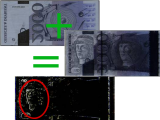
In a three-year project, we examined ways to optimize real-time banknote sorting using insights from sensor data fusion. Together with our industry partner ![]() Giesecke+Devrient, fusion principles have been examined for sensors based on diverse physical measurement principles. The project page is
Giesecke+Devrient, fusion principles have been examined for sensors based on diverse physical measurement principles. The project page is ![]() here.
here.
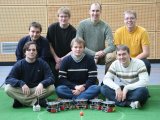 |
Our RoboCup group is a true student project: students design the hardware of small-size soccer-playing robots and develop the artificial intelligence. Meanwhile, our team "ER-Force" has a track record of successes. On the world championship in Singapore 2010, ER-Force advanced to the quarter finals!
Check out the ![]() project page, and the
project page, and the ![]() team's web page as well!
team's web page as well!